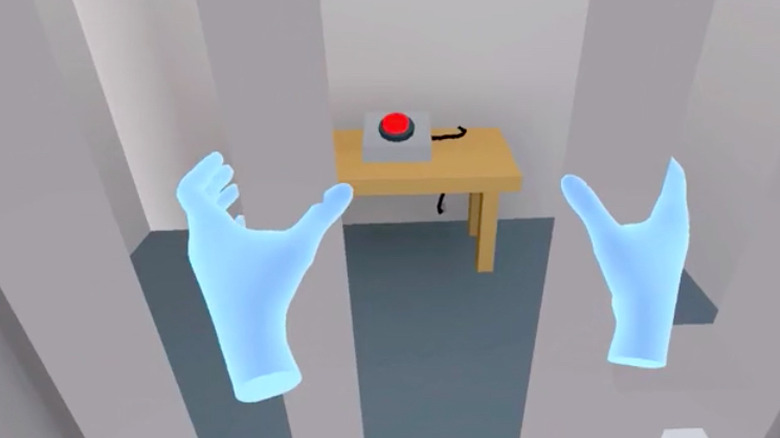The Exciting Truth Behind This VR Proof Of Concept
Back in December, Oculus introduced a new experimental feature to the Oculus Quest: hand tracking. While the feature allowed users to control things with their hands and do away with the usual Oculus Touch controllers for the Oculus Quest, it was only for use in limited scenarios. Specifically, the hand tracking feature really only allowed for browsing through the Oculus menu and using a few first party apps. Still, it was neat to be able to change settings and browse through the game library without bothering with picking up a controller.
The idea was to test out the functionality of hand tracking and to see if Oculus Quest users responded positively to the innovation, with further functionality implemented over time. Naturally, however, the question on everyone's minds was how this feature could translate to actual gameplay. When could we expect to be able to interact with a virtual world in the comfort of our homes and without needing to use a specific controller?
Well, one developer has decided to take the creation of new controller-less VR games into his own virtual hands. Daniel Beauchamp, Shopify's Head of VR and AR, has created a few fun little proof of concept titles to take advantage of hand tracking. While they're not exactly revolutionary immersive experiences, they do seem to be quite a lot of fun.
One of these is called "Hand Walking," in which players make a walking gesture with their fingers in order to propel themselves forward. Another concept, "Thrown Hand," allows players to chuck their own disembodied hands at objects to solve puzzles or reach things out of their grasp. The third concept is called "Finger Skateboard" and it essentially functions as a VR version of a Tech Deck toy skateboard. Players hold down the virtual skateboard with their fingers and manipulate it into doing different tricks and flips.
Again, these are all rather basic, but they do show promise. Each of them utilize different physics and gameplay mechanics, showing that the possibilities for more in-depth applications of these concepts are possible. It's a baby step toward a much more interactive form of virtual reality gameplay, all built off of the concept of hand tracking technology.
In a statement to Road to VR, Beauchamp explained why he'd taken to fiddling with different VR concepts like this on his personal time.
"One of the best ways to unlock new & powerful ideas is to build upon silly ideas. That's what I'm doing with hand-tracking," said Beauchamp. "I play around with many little ideas that bring a smile to people's faces. They may seem random, but I'm learning a lot about what's possible with the tech and interactions that could be applied elsewhere."
According to Beauchamp, this adds up to a valuable learning experience. His philosophy seems to be that overthinking a new innovation can lead to it never really having the opportunity to grow.
"I wish more VR devs did this. Don't put the burden on yourself to build out a whole game or build out a whole product," Beauchamp added. "Build many small things, no matter how silly they may seem. You'll be surprised at just how much you learn."
While the actions within these small "games" aren't exactly the most revolutionary, there's still something to be said for the novelty of being able to carry out these tasks in VR without the use of a controller. If the response on social media is anything to go by, Beauchamp may be onto something here.
Shortly after Beauchamp posted a video showing hand tracking allowing a player to use a virtual yo-yo, one user tweeted that Beauchamp's experiments were "endlessly interesting." One Reddit user commenting on "Thrown Hand" said that they could see themselves purchasing an indie game that played in that style.
The Oculus Quest, of course, is far from being the only notable VR system on the market. In fact, Sony is prepping a follow-up the successful PlayStation VR, presumably to launch alongside the PlayStation 5 later this year (provided the PS5 isn't terribly delayed, of course). Maybe they could take a few cues from Oculus' hand tracking technology and Beauchamp's task-oriented thinking? It would be kind of fun to see what Sony could cook up for the PSVR using these design concepts with established characters. Imagine Uncharted's Nathan Drake solving intricate puzzles in first person, all without ever picking up a controller.
While most games will likely stick to using controllers or other peripherals for the foreseeable future, it's encouraging to see some developers thinking outside the box.

